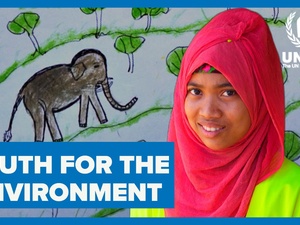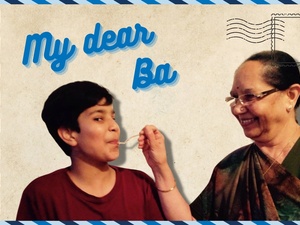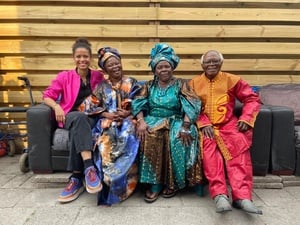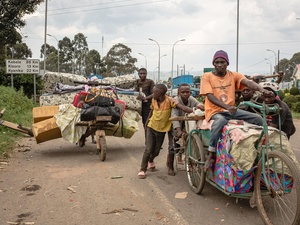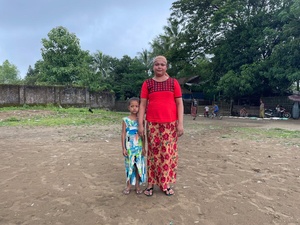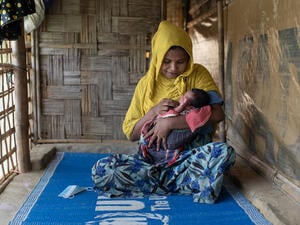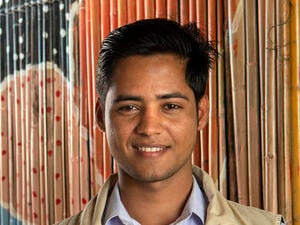Canada is first country to resettle Rohingya refugees from Bangladesh
Canada is first country to resettle Rohingya refugees from Bangladesh

A Rohingya refugee woman cleans her ustensils in dirty and unsanitary conditions in Bangladesh.
KITCHENER, Canada, April 20 (UNHCR) - Shofique Ahmed sits swathed in layers of clothing under his anorak. Decades ago he was a farm labourer in Myanmar's northern Rakhine state. It's early spring, but looking out at the blowing snow he must wonder at the effort it takes to grow anything in the south-western Ontario town of Kitchener.
Ahmed, his wife Hamida, and their six children are among 23 Rohingya refugees - a de facto stateless Muslim minority from Myanmar - that Canada accepted for resettlement from camps in Cox's Bazar in the the southern tip of Bangladesh. This group of Rohingyas is the first accepted for resettlement.
Ahmed's family, along with two widows - Sajida Begum and her 24 year-old son Sayed Alum and Sabara Khatun and her 22 and 12-year-old sons - arrived in Canada last December. Ten other refugees are scheduled to arrive later.
They, along with 260,000 others, fled to Bangladesh in 1991 to escape repression from government security forces because of their Muslim religion and ethnicity. While tens of thousands have returned home, they and 26,000 other Rohingyas have refused to repatriate, opting for the relative safety of squalid refugee camps.
The families bring a precious resource that settlement workers say will help them build a new life in Canada: Ahmed's 18-year-old son Forid and the adult sons of Begum and Khatun speak some English.
"We learnt to speak English in the camps," says Forid. Even though there was no formal schooling, we learnt with the help of private tutors." The "private tutors" were aid workers and UNHCR staff.
For now each member of the family attends English-language classes, but the fact the adult sons have some language skills is enormously helpful in giving the families some autonomy for essential activities like shopping without resorting to settlement workers or interpreters.
Despite their first taste of extreme winter , Sajida Begum exclaims "we are so happy here, happier than the idea of going home because there we endured unbearable treatment".
"When we found out in Bangladesh that we were accepted to come to Canada, our happiness filled our bodies with energy," enthused her son, Sayed Alum.
Like tens of thousands of refugees from elsewhere who have preceded them to Canada, Sayed Alum states a major preoccupation: "How will I manage to look after my mother when I will need to work?"
While the Canadian government covers initial costs for essentials such as food, furniture and clothing, including a monthly living allowance, this assistance lasts only for one year, when it is expected they will find a job.
"I am not too worried about this group," affirms Mira Maidzanovic, manager of the Reception Centre in Kitchener. "They will do very well because they are very motivated. Not only are they very careful with their money, they are very cooperative, punctual, never late for appointments, and are very friendly.
Joesph Oywak, a settlement worker and former refugee from South Sudan, provides life-skills orientation to new arrivals. He agrees the Rohingya refugees have shown a remarkable degree of adaptation, especially considering the absence of a similar ethnic group nearby. "Having found a nearby mosque in Kitchener has also been a very helpful in giving them a sense of place," he said.
Hard work, persistence and discipline are qualities that lead nowhere in a refugee camp where life is defined by enforced idleness. The opportunity to start anew in Canada has opened up a future of possibilities.
I want to be a doctor," states 22-year-old Sayed Ahmed. "I know it will not be easy, and maybe I won't succeed, but that has always been my desire."
All were quick to recognize the need to master new skills to find entry-level jobs. "My priority is to take computer lessons and learn to drive a car," said Sayed Alum".
His mother, Sabara Khatum, however, feels her happiness will be complete only once she can bring her whole family to Canada. Four of her adult children and their families remain in refugee camps in Bangladesh.
"This group was accepted on UNHCR's referral," said Rick Herringer, director of the Refugee Resettlement section at the Canadian Department of Citizenship and Immigration. "Canada plans to resettle additional small numbers of Rohingya refugees from Bangladesh in 2007."
"We are grateful to Canada because until the resettlement of this group, the only solution open to Rohingyas was to return home, and many have done so," said Jahanshah Assadi, UNHCR Representative in Canada. "The challenge now is to find solutions for the thousands who remain in camps, knowing that resettlement to a third country will only be available for those deemed most vulnerable."
Last year Canada resettled 10,651 refugees from over 60 different nationalities. The top five countries of origin were: Afghanistan, Colombia, Ethiopia, Myanmar and Sudan.


